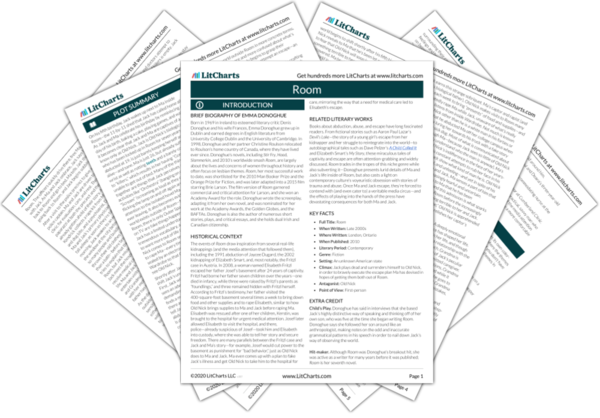Isolation
In her novel Room, Emma Donoghue focuses on a mother and son living in an extreme set of circumstances. Prisoners of a mysterious kidnapper whom they refer to only as Old Nick, Ma and Jack—her five-year-old son, and a product of Old Nick’s multiple rapes—are confined to a one-room shed and cut off from the rest of the world. In the space they call Room, Ma and Jack watch television, read…
read analysis of IsolationGrowing Up
When Jack turns five, everything in his life changes. Ma begins “unlying” to him, explaining that the way he has conceived of the world—as no bigger than the confines of Room and containing no humans but him, his mother, and occasionally Old Nick—is false. Jack’s coming-of-age tale is an unusual one: it involves an escape from captivity and an intense period of physical and psychological adjustment to the world. Jack misses Room at first…
read analysis of Growing UpParenting
Emma Donoghue’s Room is an uplifting ode to the power of maternal love in the face of unimaginable circumstances, but it is also an unforgiving look at the fear, uncertainty, and guilt that accompany parenthood. Though at the outset of the novel, Ma has spent her last seven years in captivity—and Jack has been imprisoned for the entirety of his life—they draw strength from one another, and Ma especially finds herself reaffirmed in the value…
read analysis of Parenting
Voyeurism and the Media
The events of Room, though fictional, draw inspiration from several real-life incidents: the 1991 abduction of Jaycee Dugard, the 2002 kidnapping of Elizabeth Smart, and, most notably, the 2008 case of Elisabeth Fritzl, an Austrian woman who was imprisoned in the basement of her parents’ apartment building and raped repeatedly by her father for years, ultimately bearing him seven children. All of these cases received widespread media attention—and in Room, Ma and Jack…
read analysis of Voyeurism and the Media






